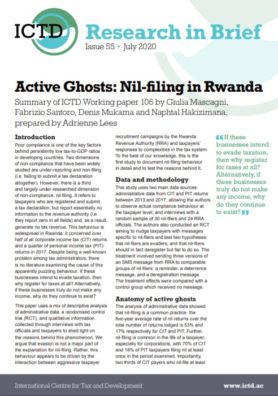Research in Brief 55
Poor compliance is one of the key factors behind persistently low tax-to-GDP ratios in developing countries. Two dimensions of non-compliance that have been widely studied are under-reporting and non-filing (i.e. failing to submit a tax declaration altogether). However, there is a third and largely under-researched dimension of non-compliance: nil-filing. It refers to taxpayers who are registered and submit a tax declaration, but report essentially no information to the revenue authority (i.e. they report zero in all fields) and, as a result, generate no tax revenue. This behaviour is widespread in Rwanda: it concerned over half of all corporate income tax (CIT) returns and a quarter of personal income tax (PIT) returns in 2017. Despite being a well-known problem among tax administrators, there is no literature examining the cause of this apparently puzzling behaviour. If these businesses intend to evade taxation, then why register for taxes at all? Alternatively, if these businesses truly do not make any income, why do they continue to exist? This paper uses a mix of descriptive analysis of administrative data, a randomised control trial (RCT), and qualitative information collected through interviews with tax officials and taxpayers to shed light on the reasons behind this phenomenon. We argue that evasion is not a major part of the explanation for nil-filing. Rather, this behaviour appears to be driven by the interaction between aggressive taxpayer recruitment campaigns by the Rwanda Revenue Authority (RRA) and taxpayers’ responses to complexities in the tax system. To the best of our knowledge, this is the first study to document nil-filing behaviour in detail and to test the reasons behind it.
